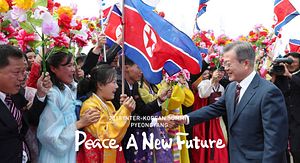If it was the Pyongyang cold noodles that grabbed public attention at the first inter-Korean summit in March, last week’s inter-Korean summit introduced the pine mushroom.
In order to celebrate the summit, North Korea sent 2 tons of pine mushrooms to South Korea, the value of which is estimated to be in the region of $1.4 million. The South Korean government later announced that it will deliver these mushrooms to 4,000 separated family members who were not able to attend the last family reunion.
Social media outlets in South Korea have blown up with posts about these mushrooms. Many online users actively shared images of mushrooms with witty comments, welcoming this nice gesture by North Korean leader Kim Jong Un.
One of the recipients even attempted to resell the mushrooms online, which sparked a negative backlash from netizens. Regardless, the pine mushrooms from the North successfully caught attention from the South Korean people.
In fact, this is not the first time that Pyongyang has gifted these mushrooms to Seoul. North Korea’s former leader Kim Jong Il also gave pine mushrooms to the South as a present in both 2000 and 2007, at previous inter-Korean summits.
Why pine mushrooms?
For starters, pine mushrooms are treated as one of the most important regional products in North Korea. The country even released a stamp featuring these mushrooms in July 2017.
But there is more to it than that. Surprisingly, these mushrooms are often utilized by Pyongyang as a way of making foreign money to overcome intensifying international sanctions.
According to North Korean defectors, the North Korean authorities have been actively collecting pine mushrooms from residents across the country, exchanging the mushrooms for essential daily necessities including flour and candy powder.
Although the exchange rate is slightly different each year, the North Korean authorities usually gave 10 kilograms of flour per kilogram of pine mushrooms. Currently, 10 kg of flour is worth about 60,000 North Korean won (roughly $7.5), while pine mushrooms trade for 350-400 Chinese yuan (about $51- $58) per kilogram in China. In other words, purchasing pine mushrooms from residents and selling them in China is a highly profitable business for North Korea, earning them a profit of $43 to $51 per kilogram.
Accordingly, the distribution and sales of such mushrooms are prohibited by the North Korea government, and offenders are subject to heavy punishment.
Given the fact that North Korea has a foreign currency shortage due to international sanctions, its move to give the valuable mushrooms to South Korea can be seen as a very generous gesture or a sign showing its sincere willingness to improve inter-Korean relations further.
However, not everyone is happy with North Korea’s gift. Some have raised concerns that the pine mushrooms could be radioactive, as North Korea’s best-known production site for these mushrooms is located near Punggye-ri Nuclear Test Site.
Multiple sources suggest that there is a high possibility that the pine mushrooms produced at Chilbo mountain — located only 30 km from Punggye-ri — may well have been exposed to radiation.
The wife of a North Korean nuclear scientist told Seoul-based magazine Monthly Chosun in 2017 that Punggye-ri is famous for pine mushrooms and yellow trout. She claimed that from 2006, the time of the first nuclear test, to 2016 thousands of tons of pine mushrooms were collected there.
Amid increasing public concerns over the mushrooms, South Korea’s presidential office said that the North Korean pine mushrooms had gone through rigorous inspection and quarantine procedures upon arriving at Seoul Airport, and before being sent on to the separated family members.
But the Blue House did not specify where the mushrooms came from, leaving those concerns, well, mushrooming.

































